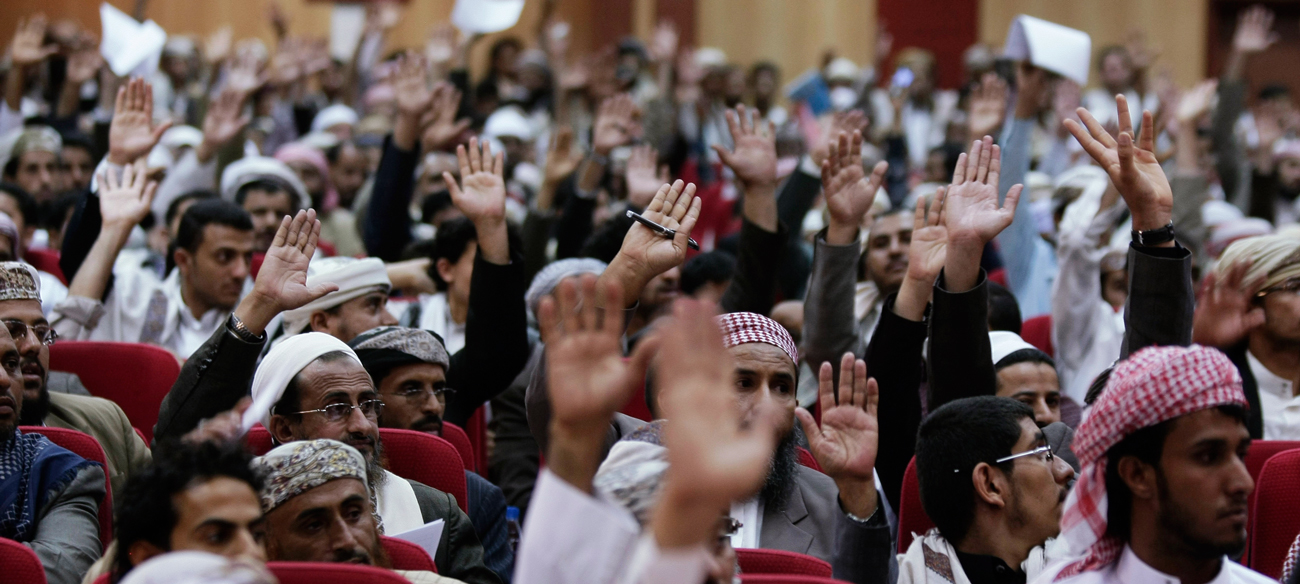Civil Society and Peace Processes
Civil society plays an important role in peacemaking and peacebuilding. Inclusive Peace applies a broad functional understanding of civil society. This approach allows us to support civil society in engaging in different roles by using a variety of strategies to participate in and influence peace and political transition processes.
Why work with civil society?
The concept of civil society is grounded in Western liberal philosophy, which often aspires to a specific ideal rather than complex and diverse realities. As a result, in mediation, peacebuilding, and development practice, civil society is sometimes understood too narrowly as mainly modern and “benevolent” non-governmental organisations (NGOs) and charities.
At Inclusive Peace, we apply a broad conceptualisation of civil society, understood as a wide range of actors including professional associations, clubs, unions, faith-based and NGOs, as well as traditional and clan groups. The media, businesses, and political parties – with the exception of their professional associations – are often excluded in the definition of civil society.
We also identify civil society as a dynamic social sphere rather than a separate sector. This understanding recognises that most people belong to more than one group and sector such as state, business, and family besides civil society. It also recognises that the values, identity, and positioning of civil society and civil society organisations (CSOs) evolve as a result of history, violence, or political change. The context in which civil society operates also plays an important role, influencing the space available to act, strengthening or limiting how effective civil society can be.
How we work with civil society
We focus on how, when, and under what conditions civil society does or does not fulfil a peace-supporting role. We support civil society actors and their supporters to better understand how civil society contributes to reducing violence, ending armed conflict, and building sustainable peace.
We apply a functional approach to what civil society actors can contribute to peacemaking and peacebuilding. This approach helps to first identify what is needed in specific contexts and at different phases of a process. It then analyses which actors may have the potential to fulfil these functions in the short, medium, and long term from the perspective of what they do, not who they are. This allows us to look at the universe of existing societal forces that can influence peace processes rather than just focusing on well-known, pro-peace NGOs and similar groups.
Report,
Civil Society & Inclusive Peace: Key insights and lessons from a global consultation convened on Peace Insight
This report shares key insights and lessons from a series of global consultations with civil society peacebuilders. It highlights the importance of inclusion in peacebuilding theory and discusses obstacles when it comes to practical implementation.
February 2019Peace Direct, IPTI,
Report,
Civil Society’s Role in Monitoring and Verifying Peace Agreements: Seven Lessons from International Experiences
This report summarises the findings of two comprehensive research projects. It formulates seven lessons from international experience on Civil Society’s role in monitoring and verification in peace processes.
January 2017Nick Ross,
Briefing Note,
Civil Society in Peace Processes at a Glance
This briefing note provides an overview of Civil Society’s role in peace processes. It covers the nature of Civil Society, it’s various peacebuilding functions as well as relevant factors of influence.
April 2016IPTI,
Book,
Civil Society and Peacebuilding: A Critical Assessment
This collected volume identifies the functions of Civil Society in peacebuilding. A comprehensive analytical framework is applied to 11 country cases, allowing for comparative analysis and providing a new tool for further research.
January 2010Thania Paffenholz,
Paper,
Civil Society and Peacebuilding: Summary of Results from a Comparative Research Project
This paper summarises the results of a comparative research project on Civil Society’s possible functions in peacebuilding and peace processes. The project was conducted over a period of three years and includes 13 case studies.
February 2009Thania Paffenholz,
Briefing Note,
Can Inclusive Peace Processes Work? New Evidence From a Multi-Year Research Project
This briefing note summarises key findings on inclusion in peace processes from the multi-year research project “Broadening Participation in Political Negotiations and Implementation”.
April 2015Thania Paffenholz,
Paper,
Broadening participation in peace processes: Dilemmas and options for mediators
This paper offers insights to mediators on the dilemmas and options of broadening participation in peace processes with a special focus on Civil Society and inclusion.
June 2014Thania Paffenholz,
Briefing Note,
The Role of Legitimacy in the Governance of Fragile States: Preliminary Findings on Legitimacy and Inclusion
This briefing note presents insights on inclusion and state legitimacy. It draws upon the Broadening Participation Project to study the relationship between broader inclusion in peace negotiations and negotiation processes’ legitimacy.
June 2016IPTI, HIS,



